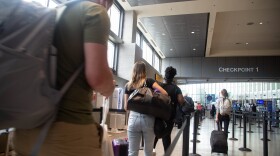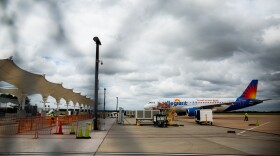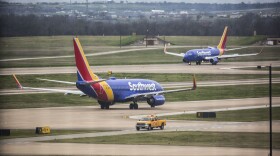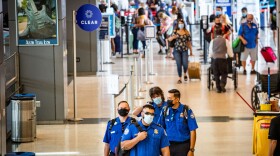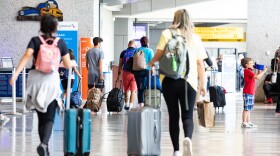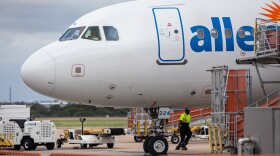Austin-Bergstrom International Airport is busier than ever. With more than 250 flights a day, the airport is drawing an unprecedented number of passengers. But airline counters, TSA screening lines and concession businesses don't have enough employees.
The result has been notoriously long lines.
With a busy Memorial Day weekend around the corner, the people who run the city-owned airport are now recommending people arrive two and a half hours before boarding, not departure, for domestic flights, and three hours early for international flights. That's a half hour earlier than the previous recommendation issued in late March.
Southwest, the largest operator of flights out of Austin, says planes board 30 to 45 minutes before departing, depending on the type of aircraft. Delta says domestic flights begin boarding at least 35 minutes prior to departure. Starting June 2, that will increase to 40 minutes. International departures usually have a longer boarding period.
That variation in how early people board before departing is what prompted the new guidance, ABIA says.
"We can't necessarily predict when they're going to be boarding, how long that will take," airport spokesperson Bailey Grimmit said. "I need to make sure that there's plenty of time for me to get there before the boarding begins."
With TSA lines back out the door this week, and the new guidance to arrive three hours or more before departure, Congressman Lloyd Doggett (D-Austin) is urging the head of the TSA to send more agents to ABIA.
Doggett said in a letter to TSA Administrator David Pekoske that the TSA is "thoroughly unprepared" to process the large volumes of travelers that are expected over Memorial Day weekend.
TSA has sent 50 temporary officers to ABIA from the federal agency's so-called National Deployment Force, which is meant to supplement the TSA workforce at very busy airports. Another 11 temporary officers will be in Austin by the holiday weekend.
"What we need most, as both the Airport Director and I have urged, is more TSA officers, but I believe you also need a specific contingency plan that may require treating passengers for heat stroke if substantial relief is not promptly provided," Doggett wrote.
When asked today about ABIA before a U.S. House committee, Pekoske said the long TSA lines in Austin are caused by "staffing that doesn't meet the passenger volumes we are seeing."
Ultimately, the TSA administrator blames low pay for agents, calling it the "single most important thing" to boost the ranks of the agency.
A job posting for a TSA officer in Austin lists a starting salary of about $45,000.
"People looking for employment in this environment have a lot of choice. They're going to compare compensation levels," Pekoske said, adding those who start at TSA can more easily transfer to higher-paying jobs in the federal government.
President Biden's budget request for fiscal year 2023 includes $9.7 billion for the TSA, including an additional $243 million to hire 2,540 more TSA officers. The package includes $871 million to increase pay and benefits, which — according to Pekoske — many employees are counting on.
"I have great concern that if we don't meet that expectation, it's going to make it harder than it already is in the next several months," he said.





